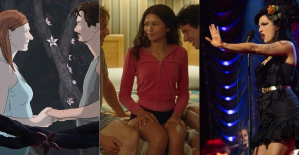When three years ago, the last pre-Corona edition of the Berlinale, "Because there is no such thing as evil" won the Golden Bear, this award also somehow belonged to Hamburg. The MOIN Film Fund supported him. The drama by the Iranian Mohammad Rasoulof explores the question of how people can remain upright in an authoritarian system. The death penalty is a key issue. Heavy stuff, challenging and not necessarily appealing to the masses. This year, Hamburg is going to the Berlinale (February 16-26) without a competition entry, but with eight productions with big German names and real potential for success. Six of them celebrate their world premiere there.
“We are very pleased that the films we support are represented in so many sections. This also shows the artistic and thematic diversity of Hamburg as a film location,” says MOIN Managing Director Helge Albers in an interview with WELT AM SONNTAG. After all, the Berlinale isn't just about the red carpet, international stars and the competition films in the Berlinale Palast. Berlinale also means many sections, i.e. rows that often radiate less glamor and yet develop enormous charisma. Not to mention the chance of getting a ticket for one of the premieres.
One of the most popular sections is Panorama, which seeks to capture moods in society and filmmaking. Ilker Çatak's "The Teacher's Room" will celebrate its world premiere in this series. Shot entirely in Hamburg, the director focuses solely on the microcosm of school, which he uses as a model for our society, with clear power structures in which everyone claims the truth for themselves. The great Leonie Benesch, this year's German shooting star, plays a young, committed teacher who gets caught between the fronts.
The Hamburg entry boasts big names in the Generation series, which is primarily aimed at a younger audience. With "When will it finally be like it never was" based on the bestseller of the same name by Joachim Meyerhoff, the drama should work across generations. In the story of the young Joachim, who grows up on the grounds of a psychiatric clinic run by his father, filmmaker Sonja Heiss brilliantly captures the tonality of the original, the mixture of laconicism, madness and youthful loss, and all this in the dull pictures of the 1970s Years. In the roles of the parents: Devid Striesow and Laura Tonke. The film will hit theaters on February 23rd.
Lars Kraume's "The Presumptuous Man" ("The Silent Classroom") should also provide a topic of conversation. The historical drama tells the story of a young Berlin ethnologist who gets sucked into the evolutionist racial theory of the late 19th century and witnesses the genocide of the Herero and Nama in the German colony of German Southwest Africa, a topic that is also highly topical in Hamburg.
In the "Encounters" series, Ayşe Polat shows her Hamburg-sponsored political thriller "Im toten Winkel", in which she weaves a web of conspiracy, paranoia and transgenerational trauma. In various media formats and from different perspectives, she lets the sensitive and poetic drama play with fantastic elements in north-eastern Turkey, where the multi-ethnic population still lives in deep-rooted conflicts. She illuminates the blind corners in which the ghosts of history live, which only the visionary seven-year-old Melek perceives.
And then there are two more documentary formats: In "Gehen und Bleiben" the filmmaker Volker Koepps travels with Uwe Johnson's texts to the places where the author lived in northern Germany and thus traces his biography. "Don't forget Meyn" tells the story of the activist Steffen Meyn, who died in an accident in the Hambach Forest in 2022. Three of his fellow students from the Academy of Media Arts in Cologne combine the material he shot with a 360° helmet camera with interviews with environmentalists. They explore the question of how far activism must go and document Meyn's struggle to find an attitude towards the radical nature of protest.
In addition, the first glimpses of the MOIN-sponsored high-end series "Davos" and the animation "Tehran Tabu" will be shown in Berlin, in which three women in Iran struggle for their self-determination. "It is the curatorial art to place the films where they fit best and get the most attention," says MOIN Managing Director Albers. Especially since the Berlinale is always just the start of the festival season. Cannes, Locarno and Venice will follow in the course of spring and summer. And then there are the Oscars, which were awarded on March 12 this year.
Hamburg is also prominently represented in Hollywood. The bitter satire "Triangle of Sadness" by Swedish director Ruben Östlund, who won the Palme d'Or in Cannes last year, has been nominated for three Oscars. Hamburg funded the film with 230,000 euros. Part of the post production and the team comes from Hamburg - including the make-up artist Stefanie Gredig.
The remake of "Nothing New in the West" produced by Malte Grunert from Hamburg is in the running for the most important film award in the world in nine categories. And the coming-of-age story Close, also supported by MOIN, has been nominated for an Oscar as one of the top five foreign films. "The Berlinale gives a lot of films a push, but it's only part of a whole festival cascade," says Albers. The main competition is not always necessary for this.

 His body naturally produces alcohol, he is acquitted after a drunk driving conviction
His body naturally produces alcohol, he is acquitted after a drunk driving conviction Who is David Pecker, the first key witness in Donald Trump's trial?
Who is David Pecker, the first key witness in Donald Trump's trial? What does the law on the expulsion of migrants to Rwanda adopted by the British Parliament contain?
What does the law on the expulsion of migrants to Rwanda adopted by the British Parliament contain? The shadow of Chinese espionage hangs over Westminster
The shadow of Chinese espionage hangs over Westminster Colorectal cancer: what to watch out for in those under 50
Colorectal cancer: what to watch out for in those under 50 H5N1 virus: traces detected in pasteurized milk in the United States
H5N1 virus: traces detected in pasteurized milk in the United States What High Blood Pressure Does to Your Body (And Why It Should Be Treated)
What High Blood Pressure Does to Your Body (And Why It Should Be Treated) Vaccination in France has progressed in 2023, rejoices Public Health France
Vaccination in France has progressed in 2023, rejoices Public Health France The right deplores a “dismal agreement” on the end of careers at the SNCF
The right deplores a “dismal agreement” on the end of careers at the SNCF The United States pushes TikTok towards the exit
The United States pushes TikTok towards the exit Air traffic controllers strike: 75% of flights canceled at Orly on Thursday, 65% at Roissy and Marseille
Air traffic controllers strike: 75% of flights canceled at Orly on Thursday, 65% at Roissy and Marseille This is what your pay slip could look like tomorrow according to Bruno Le Maire
This is what your pay slip could look like tomorrow according to Bruno Le Maire Sky Dome 2123, Challengers, Back to Black... Films to watch or avoid this week
Sky Dome 2123, Challengers, Back to Black... Films to watch or avoid this week The standoff between the organizers of Vieilles Charrues and the elected officials of Carhaix threatens the festival
The standoff between the organizers of Vieilles Charrues and the elected officials of Carhaix threatens the festival Strasbourg inaugurates a year of celebrations and debates as World Book Capital
Strasbourg inaugurates a year of celebrations and debates as World Book Capital Kendji Girac is “out of the woods” after his gunshot wound to the chest
Kendji Girac is “out of the woods” after his gunshot wound to the chest Skoda Kodiaq 2024: a 'beast' plug-in hybrid SUV
Skoda Kodiaq 2024: a 'beast' plug-in hybrid SUV Tesla launches a new Model Y with 600 km of autonomy at a "more accessible price"
Tesla launches a new Model Y with 600 km of autonomy at a "more accessible price" The 10 best-selling cars in March 2024 in Spain: sales fall due to Easter
The 10 best-selling cars in March 2024 in Spain: sales fall due to Easter A private jet company buys more than 100 flying cars
A private jet company buys more than 100 flying cars This is how housing prices have changed in Spain in the last decade
This is how housing prices have changed in Spain in the last decade The home mortgage firm drops 10% in January and interest soars to 3.46%
The home mortgage firm drops 10% in January and interest soars to 3.46% The jewel of the Rocío de Nagüeles urbanization: a dream villa in Marbella
The jewel of the Rocío de Nagüeles urbanization: a dream villa in Marbella Rental prices grow by 7.3% in February: where does it go up and where does it go down?
Rental prices grow by 7.3% in February: where does it go up and where does it go down? Europeans: “All those who claim that we don’t need Europe are liars”, criticizes Bayrou
Europeans: “All those who claim that we don’t need Europe are liars”, criticizes Bayrou With the promise of a “real burst of authority”, Gabriel Attal provokes the ire of the opposition
With the promise of a “real burst of authority”, Gabriel Attal provokes the ire of the opposition Europeans: the schedule of debates to follow between now and June 9
Europeans: the schedule of debates to follow between now and June 9 Europeans: “In France, there is a left and there is a right,” assures Bellamy
Europeans: “In France, there is a left and there is a right,” assures Bellamy These French cities that will boycott the World Cup in Qatar
These French cities that will boycott the World Cup in Qatar NBA: the Wolves escape against the Suns, Indiana unfolds and the Clippers defeated
NBA: the Wolves escape against the Suns, Indiana unfolds and the Clippers defeated Real Madrid: what position will Mbappé play? The answer is known
Real Madrid: what position will Mbappé play? The answer is known Cycling: Quintana will appear at the Giro
Cycling: Quintana will appear at the Giro Premier League: “The team has given up”, notes Mauricio Pochettino after Arsenal’s card
Premier League: “The team has given up”, notes Mauricio Pochettino after Arsenal’s card


















